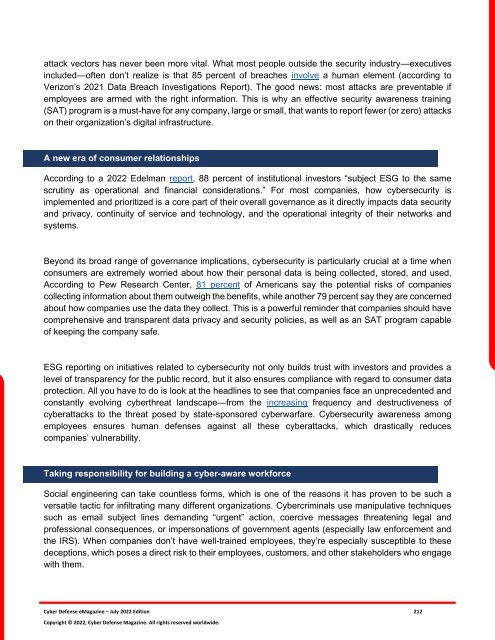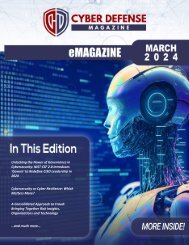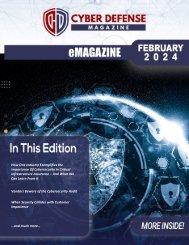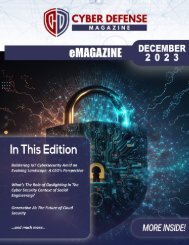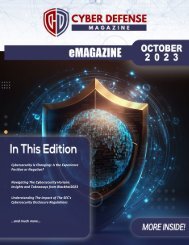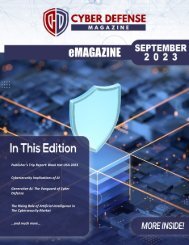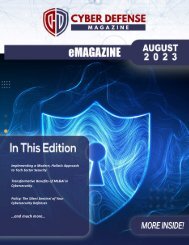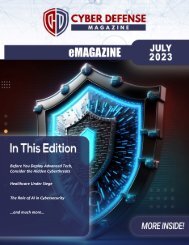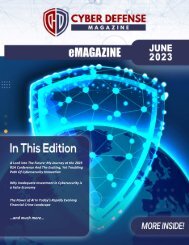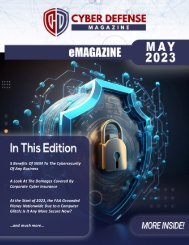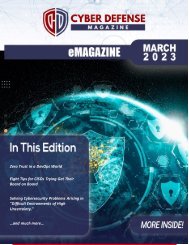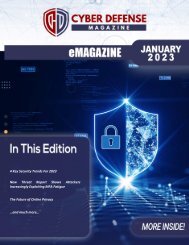Cyber Defense eMagazine July Edition for 2022
Cyber Defense eMagazine July Edition for 2022 #CDM #CYBERDEFENSEMAG @CyberDefenseMag by @Miliefsky a world-renowned cyber security expert and the Publisher of Cyber Defense Magazine as part of the Cyber Defense Media Group as well as Yan Ross, Editor-in-Chief and many more writers, partners and supporters who make this an awesome publication! Thank you all and to our readers! OSINT ROCKS! #CDM #CDMG #OSINT #CYBERSECURITY #INFOSEC #BEST #PRACTICES #TIPS #TECHNIQUES
Cyber Defense eMagazine July Edition for 2022 #CDM #CYBERDEFENSEMAG @CyberDefenseMag by @Miliefsky a world-renowned cyber security expert and the Publisher of Cyber Defense Magazine as part of the Cyber Defense Media Group as well as Yan Ross, Editor-in-Chief and many more writers, partners and supporters who make this an awesome publication! Thank you all and to our readers! OSINT ROCKS! #CDM #CDMG #OSINT #CYBERSECURITY #INFOSEC #BEST #PRACTICES #TIPS #TECHNIQUES
Create successful ePaper yourself
Turn your PDF publications into a flip-book with our unique Google optimized e-Paper software.
attack vectors has never been more vital. What most people outside the security industry—executives<br />
included—often don’t realize is that 85 percent of breaches involve a human element (according to<br />
Verizon’s 2021 Data Breach Investigations Report). The good news: most attacks are preventable if<br />
employees are armed with the right in<strong>for</strong>mation. This is why an effective security awareness training<br />
(SAT) program is a must-have <strong>for</strong> any company, large or small, that wants to report fewer (or zero) attacks<br />
on their organization’s digital infrastructure.<br />
A new era of consumer relationships<br />
According to a <strong>2022</strong> Edelman report, 88 percent of institutional investors “subject ESG to the same<br />
scrutiny as operational and financial considerations.” For most companies, how cybersecurity is<br />
implemented and prioritized is a core part of their overall governance as it directly impacts data security<br />
and privacy, continuity of service and technology, and the operational integrity of their networks and<br />
systems.<br />
Beyond its broad range of governance implications, cybersecurity is particularly crucial at a time when<br />
consumers are extremely worried about how their personal data is being collected, stored, and used.<br />
According to Pew Research Center, 81 percent of Americans say the potential risks of companies<br />
collecting in<strong>for</strong>mation about them outweigh the benefits, while another 79 percent say they are concerned<br />
about how companies use the data they collect. This is a powerful reminder that companies should have<br />
comprehensive and transparent data privacy and security policies, as well as an SAT program capable<br />
of keeping the company safe.<br />
ESG reporting on initiatives related to cybersecurity not only builds trust with investors and provides a<br />
level of transparency <strong>for</strong> the public record, but it also ensures compliance with regard to consumer data<br />
protection. All you have to do is look at the headlines to see that companies face an unprecedented and<br />
constantly evolving cyberthreat landscape—from the increasing frequency and destructiveness of<br />
cyberattacks to the threat posed by state-sponsored cyberwarfare. <strong>Cyber</strong>security awareness among<br />
employees ensures human defenses against all these cyberattacks, which drastically reduces<br />
companies’ vulnerability.<br />
Taking responsibility <strong>for</strong> building a cyber-aware work<strong>for</strong>ce<br />
Social engineering can take countless <strong>for</strong>ms, which is one of the reasons it has proven to be such a<br />
versatile tactic <strong>for</strong> infiltrating many different organizations. <strong>Cyber</strong>criminals use manipulative techniques<br />
such as email subject lines demanding “urgent” action, coercive messages threatening legal and<br />
professional consequences, or impersonations of government agents (especially law en<strong>for</strong>cement and<br />
the IRS). When companies don’t have well-trained employees, they’re especially susceptible to these<br />
deceptions, which poses a direct risk to their employees, customers, and other stakeholders who engage<br />
with them.<br />
<strong>Cyber</strong> <strong>Defense</strong> <strong>eMagazine</strong> – <strong>July</strong> <strong>2022</strong> <strong>Edition</strong> 212<br />
Copyright © <strong>2022</strong>, <strong>Cyber</strong> <strong>Defense</strong> Magazine. All rights reserved worldwide.


